Difference between revisions of "Hepatitis C"
(redirect +cat.) |
(split out) |
||
| Line 1: | Line 1: | ||
'''Hepatitis C''' is type of chronic viral hepatitis caused by the ''hepatitis C virus''. | |||
It is a type of [[medical liver disease]] | |||
==General== | |||
*Leads to [[hepatocellular carcinoma]] in the setting of [[cirrhosis]]. | |||
*Tends to be chronic; the "C" in "hepatitis C" stands for ''chronic''. | |||
*Diagnosis is by serology. | |||
Associated pathology: | |||
*[[Membranoproliferative glomerulonephritis]]. | |||
*[[Membranous nephropathy]]. | |||
*[[Cryoglobulinemia]]. | |||
==Microscopic== | |||
Features: | |||
*Lobular inflammation - this is non-specific finding. | |||
**Usually Grade 1, rarely Grade 2 and almost never Grade 3 or Grade 4.<ref>STC. 6 December 2010.</ref> | |||
*Periportal steatosis in genotype 3.<ref name=pmid16614743>Yoon EJ, Hu KQ. Hepatitis C virus (HCV) infection and hepatic steatosis. Int J Med Sci. 2006;3(2):53-6. Epub 2006 Apr 1. PMID 16614743. Avialable at: [http://www.pubmedcentral.nih.gov/articlerender.fcgi?artid=1415843 http://www.pubmedcentral.nih.gov/articlerender.fcgi?artid=1415843]. Accessed on: September 9, 2009.</ref> | |||
**Steatosis in hepatitis C is usually a secondary pathology, i.e. a separate pathologic process.<ref>OA. September 2009.</ref> | |||
===Images=== | |||
{| | |||
[[File:1 HCV 9 680x512px.tif| Hepatitis C virus. Metavir Activity Index 1 (PMN 0 LN 1).]] | |||
[[File:2 HCV 9 680x512px.tif| Hepatitis C virus. Metavir Activity Index 1 (PMN 0 LN 1).]] | |||
<br> | |||
[[File:3 HCV 9 680x512px.tif| Hepatitis C virus. Metavir Activity Index 1 (PMN 0 LN 1).]] | |||
[[File:4 HCV 9 680x512px.tif| Hepatitis C virus. Metavir Activity Index 1 (PMN 0 LN 1).]] | |||
<br> | |||
[[File:5 HCV 9 680x512px.tif| Hepatitis C virus. Metavir Activity Index 1 (PMN 0 LN 1).]] | |||
[[File:6 HCV 9 680x512px.tif| Hepatitis C virus. Metavir Activity Index 1 (PMN 0 LN 1).]] | |||
|} | |||
Hepatitis C virus. Metavir Activity Index 1 (PMN 0 LN 1). | |||
Preserved architecture shows small, inflamed triads [red arrows] and foci of spotty necrosis [blue arrows] (Row 1 Left 40X). Trichrome shows periportal fibrosis [blue arrow] and central venous sclerosis [green arrow] (Row 1 Right 100X). A higher power view of an inflamed triad with interface hepatitis, but a smooth outline, suggesting no piecemeal necrosis (Row 2 Left 200X). A focus of spotty necrosis near an unafflicted triad below it (Row 2 Right 200X). Reticulin shows collapse [arrows] extending from/near portal triad without piecemeal necrosis (Row 3 Left 200X). Reticulin shows collapse [arrows] extending from/near central vein (Row 3 Right 200X). | |||
{| | |||
[[File:1 hcv 6 680x512px.tif|Inflamed bands cross hepatocytes with steatosis (Row 1 Left 40X).]] | |||
[[File:2 hcv 6 680x512px.tif|Trichrome shows extensive bridges (Row 1 Right 40X).]] | |||
<br> | |||
[[File:3 hcv 6 680x512px.tif|Trichrome also documents early nodule formation (Row 2 Left 40X).]] | |||
[[File:4 hcv 6 680x512px.tif|Reticulin shows regeneration (two nuclei per cord) in a nodule, but not throughout (Row 2 Right 200X).]] | |||
<br> | |||
[[File:5 hcv 6 680x512px.tif|Hematoxylin and eosin shows piecemeal necrosis as inflammatory cells surrounding hepatocytes (Row 3 Left 400X).]] | |||
[[File:6 hcv 6 680x512px.tif|Reticulin shows black lines about hepatocytes, indicating confluent piecemeal necrosis (Row 3 Right 400X).]] | |||
|} | |||
Hepatitis C with metavir stage IV fibrosis (advanced fibrosis/cirrhosis) and confluent piecemeal necrosis. | |||
Inflamed bands cross hepatocytes with steatosis (Row 1 Left 40X). Trichrome shows extensive bridges (Row 1 Right 40X). Trichrome also documents early nodule formation (Row 2 Left 40X). Reticulin shows regeneration (two nuclei per cord) in a nodule, but not throughout (Row 2 Right 200X). Hematoxylin and eosin shows piecemeal necrosis as inflammatory cells surrounding hepatocytes (Row 3 Left 400X). Reticulin shows black lines about hepatocytes, indicating confluent piecemeal necrosis (Row 3 Right 400X). | |||
{| | |||
[[File:1 HCV 7 680x512px.tif|Hepatitis C. Metavir Activity Index 2 (PMN2, LN1), Metavir fibrosis stage 3]] | |||
[[File:2 HCV 7 680x512px.tif|Hepatitis C. Metavir Activity Index 2 (PMN2, LN1), Metavir fibrosis stage 3]] | |||
<br> | |||
[[File:3 HCV 7 680x512px.tif|Hepatitis C. Metavir Activity Index 2 (PMN2, LN1), Metavir fibrosis stage 3]] | |||
[[File:4 HCV 7 680x512px.tif|Hepatitis C. Metavir Activity Index 2 (PMN2, LN1), Metavir fibrosis stage 3]] | |||
<br> | |||
[[File:5 HCV 7 680x512px.tif|Hepatitis C. Metavir Activity Index 2 (PMN2, LN1), Metavir fibrosis stage 3]] | |||
[[File:6 HCV 7 680x512px.tif|Hepatitis C. Metavir Activity Index 2 (PMN2, LN1), Metavir fibrosis stage 3]] | |||
|} | |||
Hepatitis C. Metavir Activity Index 2 (PMN2, LN1), Metavir fibrosis stage 3. | |||
Expanded dark triads, indicating interface hepatitis [red arrows], foci of steatosis [green arros], potential bridge [blue arrow] (Row 1 Left 20X). Extending from triad are stretches of apparent necrosis [green arrows], inflammatory cells bound hepatocytes afflicted by piecemeal necrosis [yellow arrows], ballooning degeneration denoted by cytoplasmic tufts [blue arrows] (Row 1 Right 400X). Reticulin shows collapse (necrosis) with thick bands [red arrows], as well as rosettes [green arrows] indicating dilated cholangioles (Row 2 Left 200X). Reticulin here shows continuous piecemeal necrosis with black bounded hepatocyte islets [arrows] (Row 2 Right 200X). Reticulin here shows a bridge with regeneration, wherein two or more nuclei lie between reticulin lines [arrows] (Row 3 Left 200X). Trichrome demarcates one of the bridges (Row 3 Right 200X). | |||
DDx: | |||
*[[Hepatitis B]] (without ground glass hepatocytes). | |||
*[[Autoimmune hepatitis]]. | |||
*[[Primary biliary cirrhosis]] without granulomas. | |||
*[[Drug-induced liver disease|Drug reaction]]. | |||
==See also== | |||
*[[Medical liver disease]]. | |||
==References== | |||
{{Reflist|1}} | |||
[[Category:Diagnosis]] | [[Category:Diagnosis]] | ||
[[Category:Medical liver disease]] | |||
Revision as of 05:14, 2 September 2016
Hepatitis C is type of chronic viral hepatitis caused by the hepatitis C virus.
It is a type of medical liver disease
General
- Leads to hepatocellular carcinoma in the setting of cirrhosis.
- Tends to be chronic; the "C" in "hepatitis C" stands for chronic.
- Diagnosis is by serology.
Associated pathology:
Microscopic
Features:
- Lobular inflammation - this is non-specific finding.
- Usually Grade 1, rarely Grade 2 and almost never Grade 3 or Grade 4.[1]
- Periportal steatosis in genotype 3.[2]
- Steatosis in hepatitis C is usually a secondary pathology, i.e. a separate pathologic process.[3]
Images
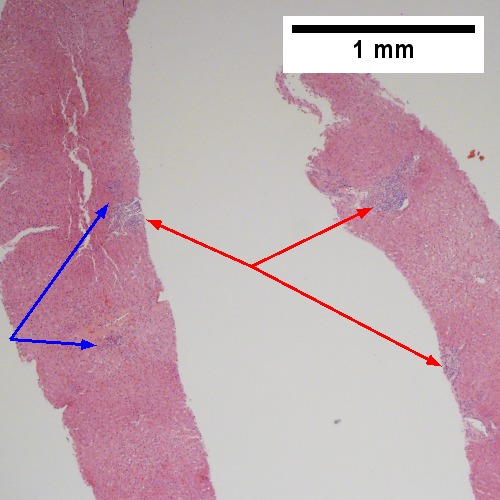
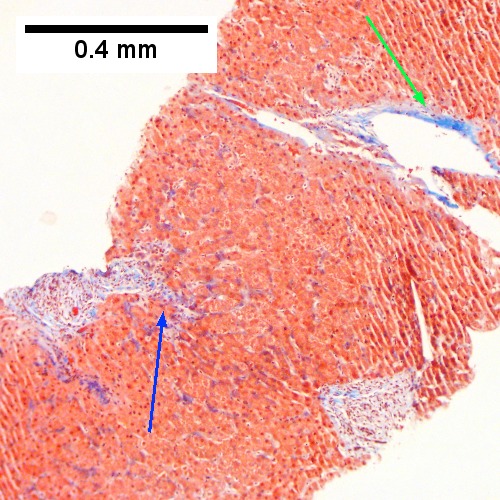
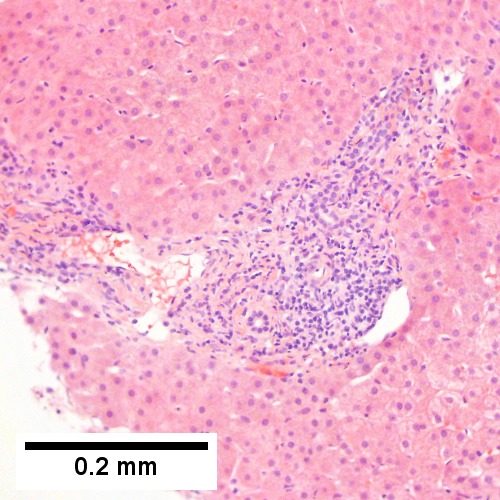
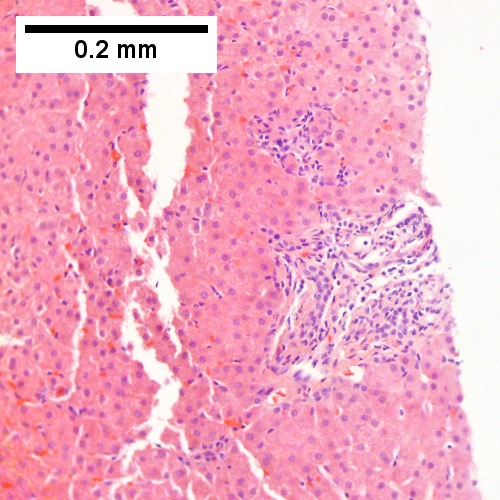
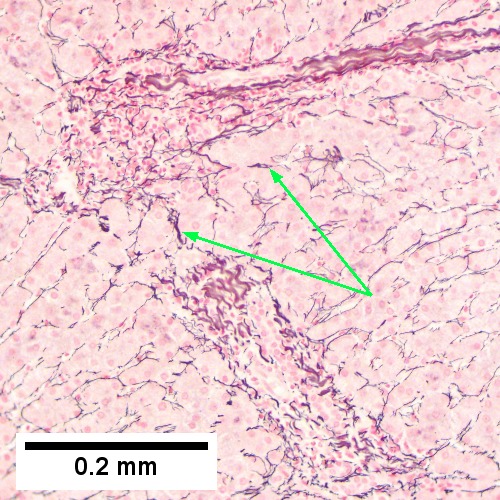
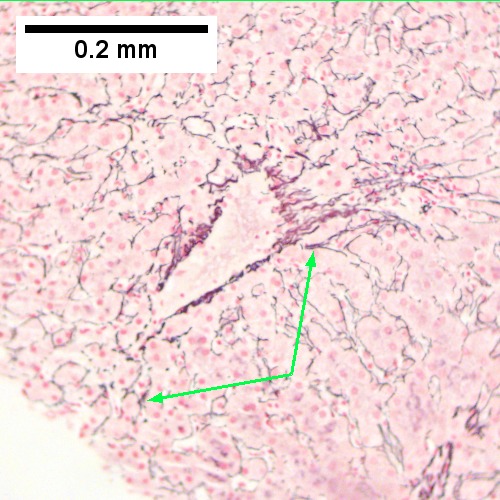
Hepatitis C virus. Metavir Activity Index 1 (PMN 0 LN 1). Preserved architecture shows small, inflamed triads [red arrows] and foci of spotty necrosis [blue arrows] (Row 1 Left 40X). Trichrome shows periportal fibrosis [blue arrow] and central venous sclerosis [green arrow] (Row 1 Right 100X). A higher power view of an inflamed triad with interface hepatitis, but a smooth outline, suggesting no piecemeal necrosis (Row 2 Left 200X). A focus of spotty necrosis near an unafflicted triad below it (Row 2 Right 200X). Reticulin shows collapse [arrows] extending from/near portal triad without piecemeal necrosis (Row 3 Left 200X). Reticulin shows collapse [arrows] extending from/near central vein (Row 3 Right 200X).
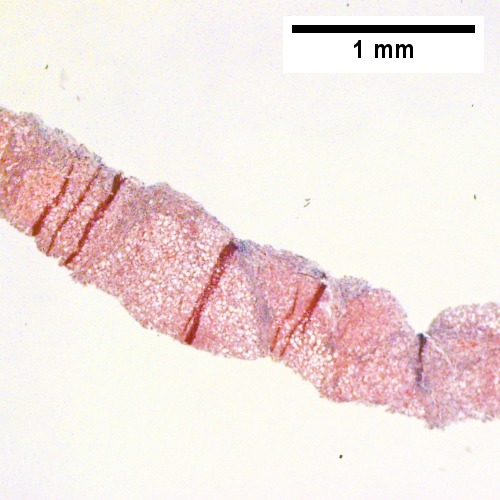
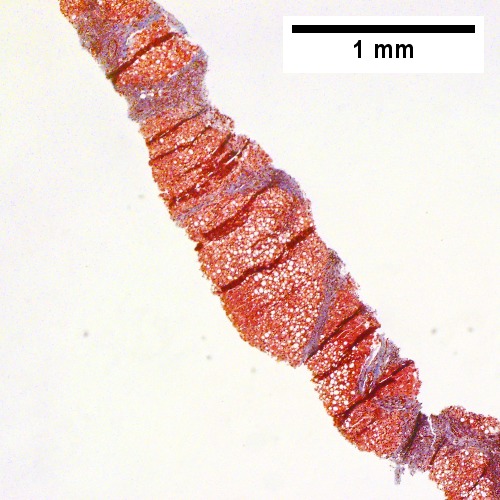
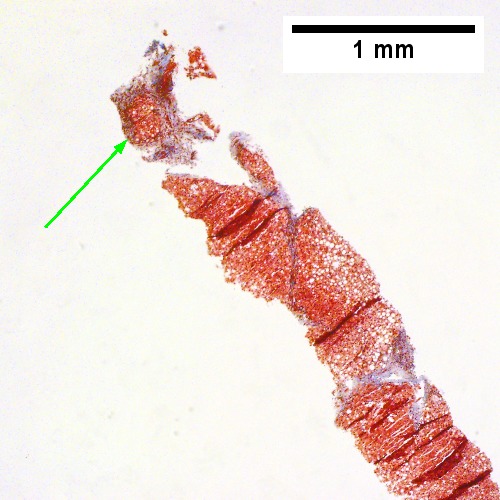
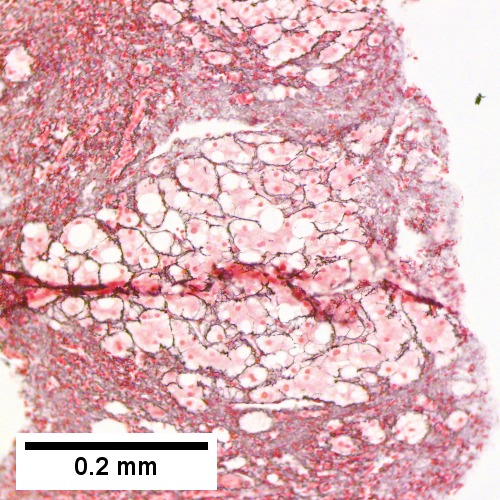
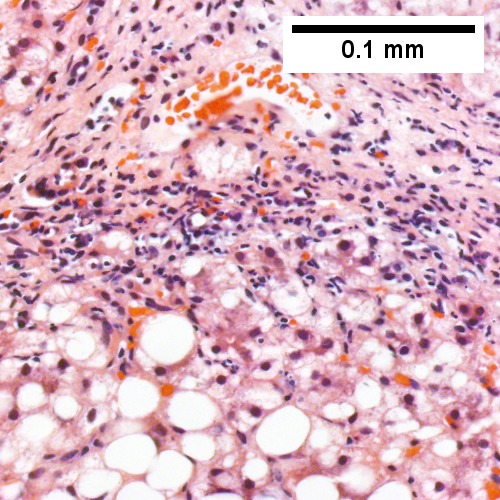
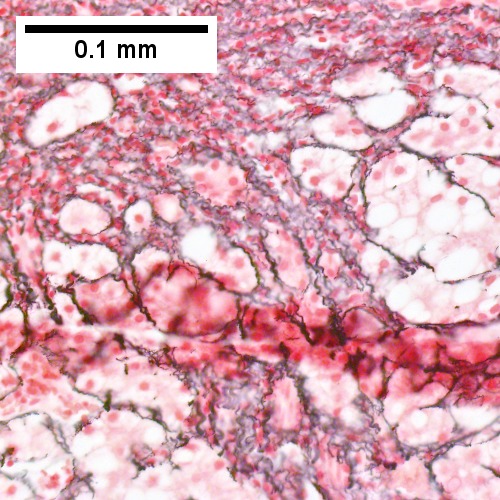
Hepatitis C with metavir stage IV fibrosis (advanced fibrosis/cirrhosis) and confluent piecemeal necrosis. Inflamed bands cross hepatocytes with steatosis (Row 1 Left 40X). Trichrome shows extensive bridges (Row 1 Right 40X). Trichrome also documents early nodule formation (Row 2 Left 40X). Reticulin shows regeneration (two nuclei per cord) in a nodule, but not throughout (Row 2 Right 200X). Hematoxylin and eosin shows piecemeal necrosis as inflammatory cells surrounding hepatocytes (Row 3 Left 400X). Reticulin shows black lines about hepatocytes, indicating confluent piecemeal necrosis (Row 3 Right 400X).
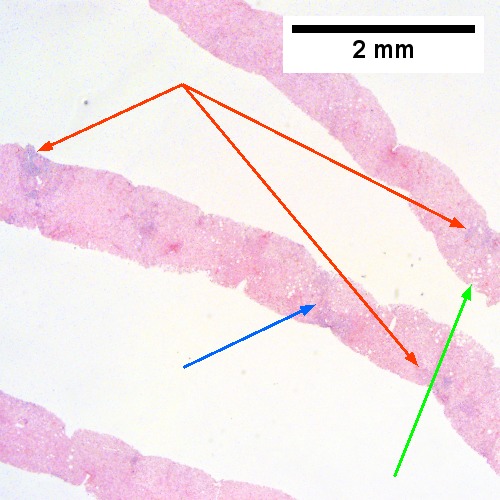
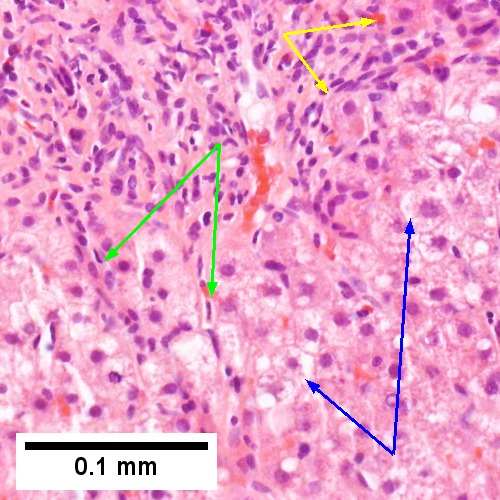
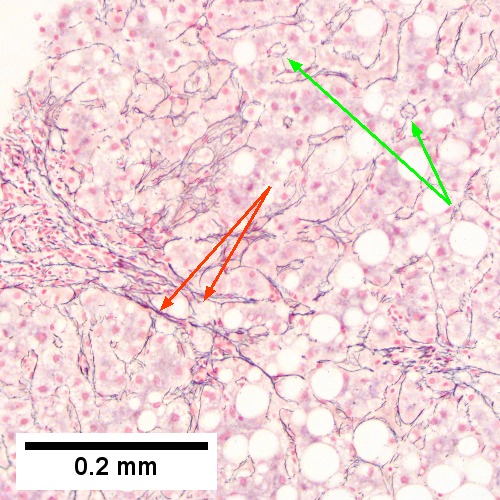
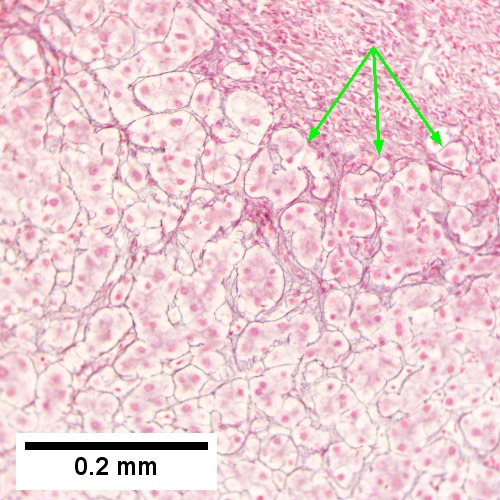
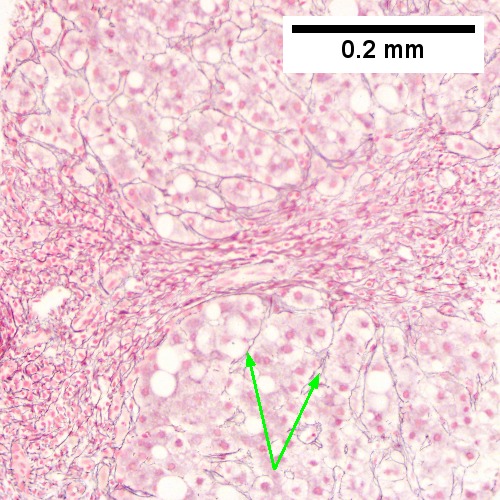
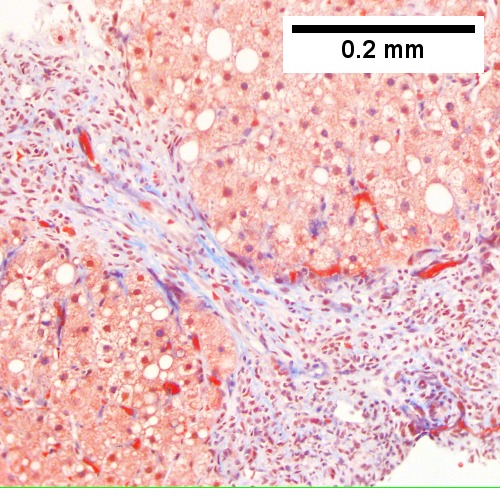
Hepatitis C. Metavir Activity Index 2 (PMN2, LN1), Metavir fibrosis stage 3. Expanded dark triads, indicating interface hepatitis [red arrows], foci of steatosis [green arros], potential bridge [blue arrow] (Row 1 Left 20X). Extending from triad are stretches of apparent necrosis [green arrows], inflammatory cells bound hepatocytes afflicted by piecemeal necrosis [yellow arrows], ballooning degeneration denoted by cytoplasmic tufts [blue arrows] (Row 1 Right 400X). Reticulin shows collapse (necrosis) with thick bands [red arrows], as well as rosettes [green arrows] indicating dilated cholangioles (Row 2 Left 200X). Reticulin here shows continuous piecemeal necrosis with black bounded hepatocyte islets [arrows] (Row 2 Right 200X). Reticulin here shows a bridge with regeneration, wherein two or more nuclei lie between reticulin lines [arrows] (Row 3 Left 200X). Trichrome demarcates one of the bridges (Row 3 Right 200X).
DDx:
- Hepatitis B (without ground glass hepatocytes).
- Autoimmune hepatitis.
- Primary biliary cirrhosis without granulomas.
- Drug reaction.
See also
References
- ↑ STC. 6 December 2010.
- ↑ Yoon EJ, Hu KQ. Hepatitis C virus (HCV) infection and hepatic steatosis. Int J Med Sci. 2006;3(2):53-6. Epub 2006 Apr 1. PMID 16614743. Avialable at: http://www.pubmedcentral.nih.gov/articlerender.fcgi?artid=1415843. Accessed on: September 9, 2009.
- ↑ OA. September 2009.